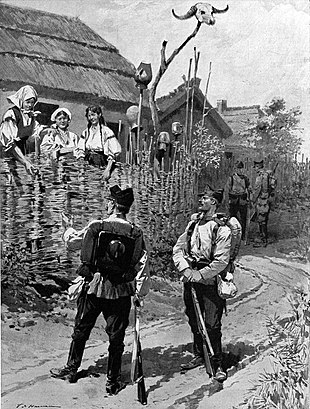
Back حزام صحي Arabic Cordó sanitari Catalan Cordón sanitario Spanish Osasun-hesi Basque Cordon sanitaire Finnish Cordon sanitaire French אזור בידוד HE Cordon sanitaire ID 防疫線 (医学) Japanese Cordon sanitaire (infecties) Dutch

A cordon sanitaire (French pronunciation: [kɔʁdɔ̃ sanitɛʁ], French for "sanitary cordon") is the restriction of movement of people into or out of a defined geographic area, such as a community, region, or country.[1] The term originally denoted a barrier used to stop the spread of infectious diseases. The term is also often used metaphorically, in English, to refer to attempts to prevent the spread of an ideology deemed unwanted or dangerous,[2] such as the containment policy adopted by George F. Kennan against the Soviet Union (see cordon sanitaire in politics).
- ^ Rothstein, Mark A. (2015). "From SARS to Ebola: Legal and Ethical Considerations for Modern Quarantine" (PDF). Indiana Health Law Review. 12 (1): 227. doi:10.18060/18963. SSRN 2499701.
- ^ Fisher, Harold H. (1927). The Famine in Soviet Russia, 1919–1923. New York: Macmillan. p. 25.
© MMXXIII Rich X Search. We shall prevail. All rights reserved. Rich X Search